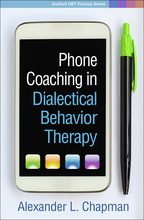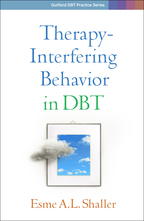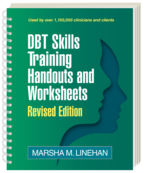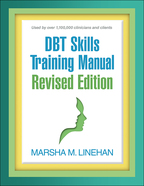Phone Coaching in Dialectical Behavior Therapy
Alexander L. Chapman
HardcoverPaperbacke-bookprint + e-book
Hardcover
orderNovember 8, 2018
ISBN 9781462537365
Price: $56.00 214 Pages
Size: 6" x 9"
Paperback
orderNovember 8, 2018
ISBN 9781462537358
Price: $37.00214 Pages
Size: 6" x 9"
Check out Guilford Digital for DBT, the app that streamlines key aspects of DBT delivery and skills training, from customizable diary cards to Marsha Linehan's complete skills library.
Sign up for emails on upcoming titles on Dialectical Behavior Therapy (DBT) (with special discounts)!
“The reader is guided to avoid numerous pitfalls in phone coaching, and gains wisdom on critical topics, including handling suicidal crisis calls and using electronic communication such as texting. Chapman makes a clear distinction between phone coaching and therapy. This book will no doubt assist clinicians in delivering comprehensive DBT effectively while balancing their work and personal lives. As Chapman states, many clinicians get that 'deer-in-the-headlights look' when introduced to the notion of phone coaching—but this engaging, motivating, often humorous book makes this mode accessible and achievable.”

—Jill H. Rathus, PhD, Department of Psychology, Long Island University Post
“Chapman is a masterful DBT clinician and teacher who describes how to structure phone coaching calls, effectively orient the client to them, and utilize DBT strategies during calls. He provides fabulous instructions for coaching the emotionally dysregulated and suicidal individual to bring about lasting change, with an emphasis on strengthening and generalizing behavioral skills in difficult situations. The dialogues with patients quoted in every chapter are worth the price of the book on their own! This how-to guide fills a significant gap in the DBT literature, and is entirely consistent with expert recommendations for the treatment of suicidal clients.”

—Charles R. Swenson, MD, Department of Psychiatry, University of Massachusetts Medical School
—Jill H. Rathus, PhD, Department of Psychology, Long Island University Post
“Chapman is a masterful DBT clinician and teacher who describes how to structure phone coaching calls, effectively orient the client to them, and utilize DBT strategies during calls. He provides fabulous instructions for coaching the emotionally dysregulated and suicidal individual to bring about lasting change, with an emphasis on strengthening and generalizing behavioral skills in difficult situations. The dialogues with patients quoted in every chapter are worth the price of the book on their own! This how-to guide fills a significant gap in the DBT literature, and is entirely consistent with expert recommendations for the treatment of suicidal clients.”
—Charles R. Swenson, MD, Department of Psychiatry, University of Massachusetts Medical School













